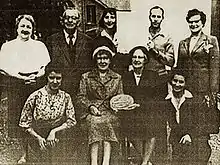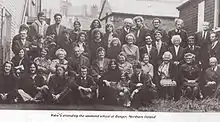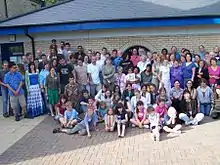Baháʼí Faith in Northern Ireland
Baháʼí Faith in Northern Ireland begins after a century of contact between Irishmen and the Baháʼí Faith beyond the island and on the island.[1][2][3] The members of the religion elected its first Baháʼí Local Spiritual Assembly in 1949 in Belfast.[4] The Baháʼís held an international conference in Dublin in 1982 which was described as “…one of the very few occasions when a world event for a faith community has been held in Ireland".[5] By 1993 there were a dozen assemblies in Northern Ireland.[6] By 2005 Baháʼí sources claim some 300 Baháʼís across Northern Ireland.[7]
| Part of a series on |
| Baháʼí Faith |
|---|
 |
Early phase
The first contact between the Baháʼí Faith and Ireland known is with a doctor serving in Persia. He examined the Báb previous to his execution. Dr. McCormick – a man with Irish roots – later said the Bab had told him even Europeans would be following his religion some day.[1]
Frederick D'Evelyn appears to have been the first Irishman to accept the Baháʼí Faith. He was born in Belfast in or about 1855 and joined the religion in 1901 and was present in California, in the United States, to welcome ʻAbdu'l-Bahá on his journeys to the West.[2] Other Irish men and women also became Baháʼís early on.[3] On 17 December 1912, Ahmad Sohrab, a secretary during ʻAbdu'l-Bahá's journeys, recorded a visitor to ʻAbdu'l-Bahá: "In Belfast, Ireland lives a fine Baháʼí, a splendid believer. She travelled all day and night to see the Master. He welcomed her most cordially and said: 'You must become the cause of the illumination of Ireland… you must ignite four thousand lamps in one year…'" It is likely this Baháʼí was Joan Waring who later moved to Donegal.[2][8]
Although there had been a Baháʼí, Stella Cairns, in Ballymena in the 1930s, and Philip Hainsworth, while in the army, had held the first fireside in Helens Bay in 1940, there were no Baháʼís in Northern Ireland by the late 1940s.[6] After this the first Baháʼí pioneer to Northern Ireland was Charles Dunning, who came to Belfast in March 1948. Within ten weeks he was arranging the first public meetings, to which George Townshend and his son Brian came from Dublin to speak.[9] He was followed by Ursula Newman (later Samandarí) in 1949.[6] A review of Townshend's Promise of All Ages in a local newspaper in 1949 and chance encounters lead to a conversion.[4] Robert Sloan was the first to become a Baháʼí in 1949.[6] The first Baháʼí Local Spiritual Assembly of Northern Ireland was elected in Belfast in 1949–50,[4] It celebrated its fiftieth anniversary at the Belfast Castle in 2000.[10] Lisbeth Greeves from Australia officially joined the religion in 1954 in Northern Ireland but she had long association with the Baháʼís. Later she wrote plays and recorded tapes on the religion.[11] Katherine Chauhan – daughter of an early Baháʼí in Northern Ireland – recalled the first Persian Baháʼís to pioneer to Northern Ireland were from Zoroastrian background and were determined to fit in and married Irish women.[4]
Growth
The first weekend schools in the British Isles were held in Belfast Castle in 1956. The first Irish Summer School was held in the Mourne Mountains.[4] On 21 April 1959 the first local Spiritual assembly was elected in Bangor, in what later became part of 'North Down Borough'.[12] Among the original members of that small community was Lady Kathleen Hornell (1890–1977), who had come over from England to live in Northern Ireland a few years earlier and then pioneered to Italy in 1960.[13] Another distinguished member of that first small group was the late Grace Pritchard, who later went on receive an honour of an Order of the British Empire[12][14] for her services in the field of education. Adib Taherzadeh was among those who arrived in Ireland in 1950 from Iran. He married Belfast-born Lesley.[15]

From the 1970s there were further developments. The first local assembly of the Baháʼís of Coleraine came into existence over a quarter of a century ago and at the University of Ulster there has been a Baháʼís Society tackling issues such as racism, prejudice, the gap between rich and poor and equality of men and women for just as long.[16] The first assembly of the Baháʼís of Derry[17] was elected in 1971.[18]

There have been Baháʼís in Magherafelt for almost a quarter of a century and issues related to reacting to the challenge of global warming and supporting a non-sectarian local school have played a role in the community.[19][20]
In the early 1970s, the first local assembly was formed in Newtownabbey.[8] The first local assembly of the Baháʼís of Craigavon which was formed on 2 April 1973.[21] The first Baháʼís moved into the Ards district in the 1970s and the first local people to become members of the religion did so in 1978. In 1979 the first assembly for the Ards Peninsula was elected.[22] World Religion Day has been observed in Omagh every year since 1984.[23]
Katherine Chauhan returned to Northern Ireland after pioneering to several countries and was married in the first Baháʼí wedding in Ballymena.[4]
The Baháʼí Council for Northern Ireland facilitates publishing a newsletter CommuNIqué,[24] operates under the National Spiritual Assembly of the United Kingdom, regularly consults with the National Assembly of the Baháʼís of the Republic of Ireland[25] and has released a series of statements about concerns in the area since 2003.[26]
Involvements
Since its inception the religion has had involvement in socio-economic development beginning by giving greater freedom to women,[27] promulgating the promotion of female education as a priority concern,[28] and that involvement was given practical expression by creating schools, agricultural coops, and clinics.[27] The religion entered a new phase of activity when a message of the Universal House of Justice dated 20 October 1983 was released.[29] Baháʼís were urged to seek out ways, compatible with the Baháʼí teachings, in which they could become involved in the social and economic development of the communities in which they lived. World-wide in 1979 there were 129 officially recognised Baháʼí socio-economic development projects. By 1987, the number of officially recognised development projects had increased to 1482. The Association of Baháʼí Women (Northern Ireland) is a body working under the auspices of the Baháʼí Council for Northern Ireland[30] and has developed and piloted by a group of Baháʼí women from Lurgan and Coleraine.[31] There is also a Belfast branch of the Association of Baháʼí Women.[10] In 2002 the group offered a seminar at The Rural College and Derrynoid Centre in Draperstown.[32]
The Baháʼís were noted as making a small but significant contribution during the conflict in Northern Ireland. During the Opsahl Commission before the cease-fires twelve Baháʼí groups or individuals made submissions.[5] Baháʼí women have been involved with women's organisations that were primarily concerned with anything to do with women and children. As Baháʼís they also talked about peace in the global sense, hoping that "some of this has filtered through".[33]
The Cookstown Baha'i Community is the home of "The Moving Hour" on Townland Radio 828.[34] R. Jackson Armstrong-Ingram was second generation Baháʼí from Belfast and worked for years as an archivist and uncovered some of the earliest history of the Baháʼís of Ireland as well as composing music and writing other books.[3][35][36][37][38][39]
Current situation
Contacts with society at large
The Northern Ireland community has taken some note of the Baháʼís. The Baháʼís held an international conference in Dublin in 1982 which was described as “…one of the very few occasions when a world event for a faith community has been held in Ireland".[5] The Baháʼís of Northern Ireland have organised a community choir in 1992 which came in second in the a capella section of choir contests in the Belfast Music Festival in 1997.[40] The Belfast Telegraph has recorded a number reports of the religion since at least 1999.[41] In 2000 it posted the obituary of Adib Taherzadeh, a former member of the Universal House of Justice, the supreme governing council of the Baha'i Faith.[15] The Baháʼís of Assembly of Londonberry was awarded a "Quaypin" by the Mayor of Derry in 2001.[5] In 2004 Lesley Taherzadeh visited in 2004 and gave a talk about life in Israel.[42] The Belfast Telegraph printed the Baha'i Council for Northern Ireland issuing its New Year's message,[43] as well as a Baháʼí point of view on Christmas.[44] The Omagh library has materials on the community[45] and a Belfast Telegram contributor visited and noted the Baháʼí Lotus Temple in India.[46] There have been public events offered as well. A member of the Voices of Bahá Choir offered an impromptu concert during a stay in Magherafelt at the home of local members Mahin and Les Gornall. The choir, a troupe of some 400, have performed with world class orchestras and given concerts in places as far apart as Moscow, New York, Budapest and Berlin.[47] The first legally recognised Baha'i marriage in Northern Ireland has taken place in Cullybackey between Carmen Zambrana Candel and John Twiname in 2004.[48]
Meanwhile, Baháʼís have continued to hold private vacation/seasonal schools as well as supporting schools in the community. The Baha'i community in Coleraine hosted its Summer School in 2001[49] while the annual Northern Ireland Baha'i Summer School was held in Portrush. The school brought together people not just from all over Ireland and Britain but from Germany, Norway, Greece, New Zealand, Israel, and the United States. A specially welcomed guest speaker was Leslie Taherazedeh, originally from Belfast, now living in the Israel, who spoke on the subject of pilgrimage.[50] Colin Palin, a 19-year-old information technology student at Magee, gave a detailed presentation at an event in at Craigavad. He spoke about how computer technology can be used as a means of communicating and sharing ideas with others.[51]

Concern of school curriculum addressing religion was a raised concern circa 2001 by the Northern Ireland Inter-Faith Forum.[52] In 2003 the Baháʼí Council for Northern Ireland made a presentation to the Churches' Religious Education Core Syllabus Review Working Party onProposals for religious education in Grant-Aided Schools[7] and welcomed the changes in 2006.[53] In 2003 a reporter for the Belfast Telegraph read a feature on a Baháʼí school in Belfast. "Every Sunday morning for the past 15 years, children have been travelling across Northern Ireland to attend a Sunday School in Belfast. They come from towns as far apart as Rostrevor, Magherafelt and Lurgan ... the school has a curriculum that has been refined over the years and is based on Baha'i principles, teaching the unity of religions, and the unity of humanity. The school is named after the famous Irish Protestant clergyman George Townshend, who became a Baha'i."[54] The reporter's comments brought a touch of controversy in response.[55] The 2010 "Northern Ireland Summer School" is set to take place again at Lorne centre.[56]
Baháʼís have contacted leading political figures. In 2006 Patrick McCarthy, Lord Mayor of Belfast in 2006, received a Baháʼí delegation.[57] The Speaker of the Northern Ireland Assembly Eileen Bell has welcomed members of the Baha'i religious community in Ireland to a special reception in Parliament Buildings for the first time. Some 150 members toured the Assembly Chamber on Saturday evening and held a short religious service in the Senate Chamber.[58][59]
Most recently the Baháʼí Council for Northern Ireland spoke out in support of the Hidden Crimes Secret Pain report of the Sexual Violence Unit of the Department of Health, Social Services and Public Safety and responded to questions the government asked for comment on.[60]
Baháʼí functions
Baháʼís have continued to interact with the Baháʼí administration. In 2001 sometime writer and artist George Fleming and quiltmaker Marion Khosravi represented Northern Ireland Baháʼís at the opening of the Terraces of the Baháʼí Gardens on the slopes of Mount Carmel out of more than 3,500 pilgrims from around the world for the ceremony.[61] In 2002 Londonberry man, Dr. Keith Munro, was appointed chairman of the Baháʼí Council for Northern Ireland.[62] The Council then held its first ever meeting in Londonderry in 2003.[63] In 2003 and 2006 Baháʼí followers from across Northern Ireland went to Belfast to meet with the National Spiritual Assembly of the United Kingdom which meets regularly to oversee and administer the affairs of the community.[64] Dr Iain Palin was a delegate from Foyle and returned from a UK-wide conference at the National Convention of the Baháʼís of the United Kingdom held in Wales. At a report of the events Dr. Palin shared about a showing of a new DVD about the Gardens of the World Centre of the religion in Israel.[65] Among the current assemblies are: Belfast, Coleraine, Derry, Magherafelt, Newtownabbey, Newtownards, and Omagh.[66]
Demographics
In 1993 there were twelve local spiritual assemblies in Northern Ireland.[6] Baháʼí assemblies and communities are organised in four clusters – multi-community groupings – in Northern Ireland.[67] There are just over a hundred Baháʼís in the Charles Dunning Cluster, (centred on Belfast,) – all of whom had finished Book 1 of the Ruhi Institute series by the fall of 2005.[68] By 2005 Baháʼí sources claim some 300 Baháʼís across Northern Ireland.[7]
See also
References
- "Baha'is mark killing of founder". belfasttelegraph.co.uk. 12 July 2005. Retrieved 2 June 2010.
- Palin, Iain S. "The First Irish Baháʼís". U.K. Baháʼí Heritage Site. Archived from the original on 20 August 2008. Retrieved 31 May 2010.
- Armstrong-Ingram, R. Jackson (July 1998). "Early Irish Baha'is: Issues of Religious, Cultural, and National Identity". Research Notes in Shaykhi, Babi and Baha'i Studies. 02 (04). Retrieved 31 May 2010.
- "History and Inspiration". CommuNIqué -Newsletter of the Baháʼí Community in Northern Ireland. Baháʼí Council for Northern Ireland (106). 1 June 2005. Retrieved 31 May 2010.
- "Book Review; The Faiths of Ireland by Stephen Skuce". CommuNIqué – Newsletter of the Baháʼí Community in Northern Ireland. Baháʼí Council for Northern Ireland (123). 1 December 2006. Retrieved 31 May 2010.
- Momen, Moojan. "Baha'i History of the United Kingdom". Articles for the Baha'i Encyclopedia. Archived from the original on 6 February 2012. Retrieved 31 May 2010.
- "Religious Education Core Syllabus". Statements on Matters of Public Interest / Concern. Baháʼí Council for Northern Ireland. 25 November 2003. Archived from the original on 3 April 2012. Retrieved 3 June 2010.
- "Who we are". The Baháʼís of Londonderry. The Baháʼís of Londonderry. Archived from the original on 28 November 2010. Retrieved 30 May 2010.
- The Universal House of Justice (1974). The Baháʼí World – An International Record Vol XIV. Welwyn Garden City, Hertfordshire, England: Broadwater Press Limited.
- "About the Baha'is". Belfast Bahai Community. Belfast Bahai Community. 2010. Archived from the original on 19 April 2010. Retrieved 30 May 2010.
- Universal House of Justice (1986). In Memoriam. The Baháʼí World. XVIII. Baháʼí World Centre. pp. 808–9. ISBN 0-85398-234-1.
- "About the North Down Baha'i Community". Official Website of the North Down Baha'i Community. bahaicommunityni.co.uk. Archived from the original on 13 July 2011. Retrieved 30 May 2010.
- Savi, Julio (1992). "Italy: History of the Baha'i Faith". Draft for "A Short Encyclopedia of the Baháʼí Faith". Baháʼí Library Online. Retrieved 1 June 2010.
- "Grace Pritchard Remembered". CommuNIqué – Newsletter of the Baháʼí Community in Northern Ireland. Baháʼí Council for Northern Ireland (144). 1 July 2009. Archived from the original on 23 October 2012. Retrieved 31 May 2010.
- Doherty, Jennifer (12 February 2000). "Obituary – Baha'i leader dies following short illness". belfasttelegraph.co.uk. Retrieved 2 June 2010.
- "Who we are". The Baháʼís of Coleraine. The Baháʼís of Coleraine. Retrieved 30 May 2010.
- "The Baha'is of Derry". Archived from the original on 18 June 2010.
- "(Wayback) Who we are The Baháʼís of Derry". The Baháʼís of Londonderry. Archived from the original on 29 November 2010. Retrieved 30 May 2010.
- "What we do". The Baháʼís of Magherafelt. The Baháʼís of Magherafelt. Retrieved 30 May 2010.
- "Solar House". Les Gornall. Archived from the original on 5 March 2010. Retrieved 30 May 2010.
- "Stalwart Pioneer Passes to the Abhá Kingdom". CommuNIqué -Newsletter of the Baháʼí Community in Northern Ireland. Baháʼí Council for Northern Ireland (55). 1 February 2001. Retrieved 31 May 2010.
- "Our Community". The Baháʼís of Newtownards. The Baháʼís of Newtownards. Archived from the original on 3 December 2008. Retrieved 30 May 2010.
- "What we do". The Baháʼís of Omagh. The Baháʼís of Omagh. Retrieved 30 May 2010.
- "CommuNIqué – Newsletter of the Baháʼí Community in Northern Ireland". Baháʼí Council for Northern Ireland. Retrieved 31 May 2010.
- "About Us". Serving the Baháʼís of Northern Ireland – and the wider community. The Baháʼí Council for Northern Ireland. Archived from the original on 16 September 2011. Retrieved 30 May 2010.
- "Statements on Matters of Public Interest / Concern". The Baháʼí Council for Northern Ireland. The Baháʼí Council for Northern Ireland. Archived from the original on 15 February 2008. Retrieved 30 May 2010.
- Momen, Moojan. "History of the Baha'i Faith in Iran". draft "A Short Encyclopedia of the Baha'i Faith". Bahai-library.com. Retrieved 16 October 2009.
- Kingdon, Geeta Gandhi (1997). "Education of women and socio-economic development". Baha'i Studies Review. 7 (1).
- Momen, Moojan; Smith, Peter (1989). "The Baha'i Faith 1957–1988: A Survey of Contemporary Developments". Religion. 19: 63–91. doi:10.1016/0048-721X(89)90077-8.
- "Association of Baháʼí Women (Northern Ireland)". Association of Baháʼí Women (Northern Ireland). Retrieved 30 May 2010.
- "Brochure". Association of Baháʼí Women (Northern Ireland). Retrieved 30 May 2010.
- "Church briefs: (down page)". belfasttelegraph.co.uk. 30 November 2002. Archived from the original on 28 July 2012. Retrieved 2 June 2010.
- "The Rhythms and Routines of Baháʼí Communities". Baháʼí International Community. 2010. Archived from the original on 30 March 2010. Retrieved 30 May 2010.
- Nau, Jean – Marie. "The Cookstown Baha'i Community". Archived from the original on 22 June 2011. Retrieved 30 May 2010.
- Lee, Anthony. "Jackson Armstrong-Ingram; In Memoriam". Biographies. Baháʼí Library Online. Retrieved 30 May 2010.
- Armstrong-Ingram, R. Jackson (November 1996). "The Provisions for Sexuality in the Kitab-i-Aqdas in the Context of Late Nineteenth Century Eastern and Western Sexual Ideologies". Society for Shaykhi, Babi, and Baha'i Studies. Providence, Rhode Island. Retrieved 31 May 2010.
- Armstrong-Ingram, R. Jackson (1998). Written in Light; ʻAbdu'l-Bahá and the American Baháʼí Community. Los Angeles, USA: Kalimat Press. ISBN 1-890688-02-9. Archived from the original on 1 November 2010. Retrieved 4 June 2010.
- Armstrong-Ingram, R. Jackson (April 1988). Studies in Babi and Baha'I History: Music, Devotions, and Mashriq'L-Adkhar. Kalimat Press. ISBN 978-0-933770-62-1.
- "Obituary: R. Jackson Armstrong-Ingram". South Bend Tribune. South Bend, IN. 4 December 2004. Retrieved 31 May 2010.
- Gornall, Les. "Northern Ireland Baháʼí Choir". Archived from the original on 7 September 2010. Retrieved 30 May 2010.
- Robinson, Viny (22 February 1999). "To the point". belfasttelegraph.co.uk. Archived from the original on 19 April 2013. Retrieved 2 June 2010.
- "Visit from Baha'i widow". belfasttelegraph.co.uk. 17 March 2004. Archived from the original on 21 July 2012. Retrieved 2 June 2010.
- "Baha'i seek a more tolerant society in new year". belfasttelegraph.co.uk. 2 January 2007. Archived from the original on 24 July 2012. Retrieved 2 June 2010.
- Brett, Sarah (24 December 2003). "Cultures in Christmas celebration". belfasttelegraph.co.uk. Archived from the original on 22 July 2012. Retrieved 2 June 2010.
- "Omagh bomb: Poignant 'Viva Espana' scrawl now in archive". belfasttelegraph.co.uk. 9 August 2008. Archived from the original on 22 July 2012. Retrieved 2 June 2010.
- McCreary, Alf (27 September 2003). "Perspectives: Passage to India". belfasttelegraph.co.uk. Archived from the original on 24 July 2012. Retrieved 2 June 2010.
- "Church briefs: (down page)". belfasttelegraph.co.uk. 9 August 2003. Archived from the original on 20 July 2012. Retrieved 2 June 2010.
- "News Briefs: (down page)". belfasttelegraph.co.uk. 28 April 2004. Archived from the original on 20 July 2012. Retrieved 2 June 2010.
- "Church briefs (down page)". belfasttelegraph.co.uk. 18 August 2001. Archived from the original on 23 July 2012. Retrieved 2 June 2010.
- "NORTHWEST – Baha'is enjoy summer school". belfasttelegraph.co.uk. 29 August 2001. Archived from the original on 1 August 2012. Retrieved 2 June 2010.
- "Student speaks at Baha'i school". belfasttelegraph.co.uk. 2 August 2005. Archived from the original on 19 July 2012. Retrieved 2 June 2010.
- Secretary, Northern Ireland Inter-Faith Forum, Norman L. Richardson (23 June 2001). "Don't give control of religious education to main Churches". belfasttelegraph.co.uk. Archived from the original on 21 July 2012. Retrieved 2 June 2010.
- "Baháʼís Welcome new RE Syllabus". Statements on Matters of Public Interest / Concern. Baháʼí Council for Northern Ireland. November 2006. Archived from the original on 23 October 2012. Retrieved 3 June 2010.
- McCreary, Alf (3 May 2003). "Perspectives: Marching to a different tune". belfasttelegraph.co.uk. Archived from the original on 19 July 2012. Retrieved 2 June 2010.
- Andrews, Cecil (14 June 2003). "Writings contrary to rational thinking". belfasttelegraph.co.uk. Archived from the original on 24 July 2012. Retrieved 2 June 2010.
- "Northern Ireland Baháʼí Summer School 2010". europeanbahai.org. Archived from the original on 26 May 2010. Retrieved 30 May 2010.
- "Visit to Right Honourable Lord Mayor of Belfast Councillor Pat McCarthy". CommuNIqué – Newsletter of the Baháʼí Community in Northern Ireland. Baháʼí Council for Northern Ireland (121). 1 October 2006. Retrieved 31 May 2010.
- McCreary, Alf (6 December 2006). "150 Baha'i members in visit to Stormont". belfasttelegraph.co.uk. Archived from the original on 23 July 2012. Retrieved 2 June 2010.
- "Church briefs (down page)". belfasttelegraph.co.uk. 5 May 2001. Archived from the original on 1 August 2012. Retrieved 2 June 2010.
- "Hidden Crimes Secret Pain". Statements on Matters of Public Interest / Concern. Baháʼí Council for Northern Ireland. 28 April 2007. Archived from the original on 23 October 2012. Retrieved 3 June 2010.
- McIlwaine, Eddie (18 May 2001). "Ulster Diary (down page)". belfasttelegraph.co.uk. Archived from the original on 23 July 2012. Retrieved 2 June 2010.
- "Baha'i chairman". belfasttelegraph.co.uk. 20 December 2002. Archived from the original on 19 July 2012. Retrieved 2 June 2010.
- "Baha'is meet in Derry". belfasttelegraph.co.uk. 28 February 2003. Archived from the original on 19 July 2012. Retrieved 2 June 2010.
- "Baha'i attend a meeting of national assembly". belfasttelegraph.co.uk. 6 December 2006. Archived from the original on 30 July 2012. Retrieved 2 June 2010.
- McDaid, Brendan (3 June 2005). "Baha'i delegate tells of future plans". belfasttelegraph.co.uk. Archived from the original on 19 July 2012. Retrieved 2 June 2010.
- "Websites of the Baháʼí Communities in Northern Ireland". Official Website of National Spiritual Assembly of the Baháʼís of the United Kingdom. National Spiritual Assembly of the Baháʼís of the United Kingdom. 27 September 2009. Archived from the original on 7 January 2009. Retrieved 30 May 2010.
- "Institute Coordinators for Northern Ireland". CommuNIqué – Newsletter of the Baháʼí Community in Northern Ireland. Baháʼí Council for Northern Ireland (117). 1 June 2006. Retrieved 30 May 2010.
- "Charles Dunning (Cluster 1)". CommuNIqué – Newsletter of the Baháʼí Community in Northern Ireland. Baháʼí Council for Northern Ireland (109). 1 September 2005. Retrieved 30 May 2010.
External links
- Official Website of the Baháʼí Council for Northern Ireland
- A Baha'i Perspective: Robert Reid Bob grew up in Belfast, Northern Ireland…